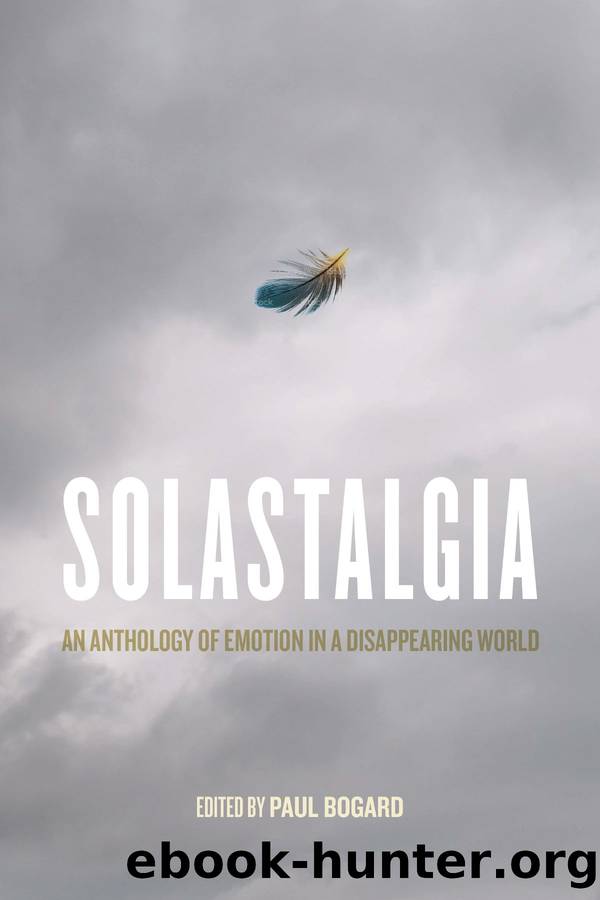Solastalgia by Paul Bogard

Author:Paul Bogard
Language: eng
Format: epub
Publisher: University of Virginia Press
A New Word to Describe New Feelings
Susan Clayton
I became interested in the psychology of environmental issues because of the emotions I heard when people talked about the natural environment. It started with their descriptions of pride in their home territory and love for specific trees. As I, and other people, focused more on current environmental crises, a wide range of negative emotions became apparent (in my own reactions as well as those of others). Fear and anxiety, yes. Sadness and grief. Guilt and anger. But positive emotions remained as well: pride, appreciation, and letâs not forget hope, the emotion at the bottom of Pandoraâs box.
As a psychologist, Iâm intrigued by the ways in which people respond to environmental topics. Iâm even, though this feels a little inappropriate, excited by the fact that my work in conservation psychology is more relevant than it has ever been. These emotions, however, coexist against a backdrop of my own anxiety, fear, and grief, emotions that I am usually able to tamp down but that occasionally take me off guard and set my heart pounding. My experience is consistent with the emotions that I have seen among climate scientists: they, too, report feeling sad, angry, afraid; hopeful and optimistic; and excited by the opportunity to investigate the issue and the chance to do research that would really matter.
Emotions are fascinating and complex. Theyâre both personal and communicative; genuine experience and performance. Although the feelings are real, we can talk ourselves into or out of experiencing many of them and even be unaware of our own emotional state. And this matters because theyâre contagious. If I feel fear, and express that fear, people around me are likely to feel at least a bit uneasyâto look around for a threat. If I talk myself out of that fear and express only calm or boredom, the people around me will take that as a signal that there is nothing to fear. This social communication that there is nothing to fear probably plays a big part in our collectively muted response to climate change. Some people who might be inclined to worry look around and see that most people are ignoring the issue, acting as if itâs not a big deal. Since we only see what they communicate, we donât know that, in fact, many of them are scared and anxious. The observable response suggests that society is not concerned.
So, the way we talk about emotions is significant. The emotion experienced in response to environmental change isnât the end of the process but a part of an ongoing system: learning about a threat to nature, having an initial reaction, maybe discussing it with others or hearing about how others have responded, maybe modifying the initial emotional reaction, determining a behavioral reaction (including inaction), maybe doing something that modifies the threat, interpreting our own behavior, interpreting the behavior of others. . . .
And because the way we talk about emotions has an impact on our own experience of those emotions, the language we use matters.
Download
This site does not store any files on its server. We only index and link to content provided by other sites. Please contact the content providers to delete copyright contents if any and email us, we'll remove relevant links or contents immediately.
The Lonely City by Olivia Laing(4782)
Animal Frequency by Melissa Alvarez(4442)
All Creatures Great and Small by James Herriot(4293)
Walking by Henry David Thoreau(3937)
Exit West by Mohsin Hamid(3805)
Origin Story: A Big History of Everything by David Christian(3675)
COSMOS by Carl Sagan(3602)
How to Read Water: Clues and Patterns from Puddles to the Sea (Natural Navigation) by Tristan Gooley(3443)
Hedgerow by John Wright(3337)
How to Read Nature by Tristan Gooley(3311)
The Inner Life of Animals by Peter Wohlleben(3293)
How to Do Nothing by Jenny Odell(3285)
Project Animal Farm: An Accidental Journey into the Secret World of Farming and the Truth About Our Food by Sonia Faruqi(3206)
Origin Story by David Christian(3182)
Water by Ian Miller(3166)
A Forest Journey by John Perlin(3052)
The Plant Messiah by Carlos Magdalena(2910)
A Wilder Time by William E. Glassley(2844)
Forests: A Very Short Introduction by Jaboury Ghazoul(2822)
